As the conflict in Ukraine continues to reshape global political and economic landscapes, efforts to rebuild the war-torn country are already underway.
- Background: Ukraine’s Reconstruction Needs Post-Conflict
- Germany’s Strategic Role in Ukraine’s Reconstruction
- The Ministry of Development’s Engagement with German Businesses
- Opportunities for German Businesses in Ukraine
- 1. Construction and Infrastructure
- 2. Energy and Green Technologies
- 3. Engineering and Technical Services
- 4. Digitalization and Smart Cities
- 5. Agribusiness and Food Security
- Challenges and Risk Management for German Investors
- Bilateral Frameworks and Support Mechanisms
- Statements from Officials and Industry Leaders
- Case Study: A Pilot German-Led Project in Ukraine
- Looking Ahead: A New Era of German-Ukrainian Economic Cooperation
- Frequently Asked Question
- What is the purpose of the Ministry of Development’s discussions with German businesses?
- Which sectors are German businesses most likely to be involved in during Ukraine’s reconstruction?
- How is Ukraine ensuring a safe and secure investment environment for German companies?
- Are there any government-backed programs supporting German participation in Ukraine’s rebuilding?
- When will large-scale reconstruction projects begin?
- How are German SMEs (small and medium enterprises) being included in the reconstruction plans?
- What are the long-term goals of German-Ukrainian cooperation in reconstruction?
- Conclusion
Recognizing the urgent need for infrastructure restoration, economic revitalization, and humanitarian support, the Ministry of Development of Ukraine has initiated a series of strategic dialogues with international partners, including German businesses and government representatives.
In a recent high-level discussion, the Ministry of Development emphasized the importance of German business participation in the long-term reconstruction of Ukraine.
More Read: Pharma Giant Abandons £1bn London Research Hub, Citing UK’s Lack of Global Competitiveness
Background: Ukraine’s Reconstruction Needs Post-Conflict
Ukraine has faced unprecedented devastation since the onset of Russia’s full-scale invasion in 2022.
Entire cities have been destroyed, millions displaced, and critical infrastructure—including transportation, healthcare, and energy systems—severely damaged or obliterated.
According to estimates from the World Bank and the European Commission, the cost of Ukraine’s reconstruction exceeds $411 billion as of 2023, with the figure continuously rising.
The rebuilding effort encompasses not only physical infrastructure but also economic recovery, institutional reform, and social cohesion.
Key Sectors for Reconstruction:
-
Transportation & logistics infrastructure: Roads, railways, bridges, and ports.
-
Energy sector: Renewable energy, power grids, and fuel systems.
-
Housing & urban development: Rebuilding residential areas and urban planning.
-
Healthcare & education: Restoring hospitals, clinics, and schools.
-
Agriculture & food security: Revitalizing Ukraine’s agricultural base.
-
Digitalization & innovation: Modern digital infrastructure and smart solutions.
To meet these demands, Ukraine is actively seeking international partners, both governmental and private, to contribute resources, expertise, and technology to support its reconstruction strategy.
Germany’s Strategic Role in Ukraine’s Reconstruction
Germany has emerged as one of Ukraine’s staunchest allies in Europe, providing military aid, humanitarian assistance, and financial support since the beginning of the war.
Now, the German government and business community are exploring deeper engagement in Ukraine’s long-term rebuilding efforts.
Key Points of Germany’s Contribution:
-
Government-led funding initiatives through the KfW Development Bank and GIZ (Deutsche Gesellschaft für Internationale Zusammenarbeit).
-
Private sector partnerships with German engineering, construction, and energy companies.
-
Technology and innovation support for digital transformation and smart city development.
-
Training and workforce development to upskill Ukrainian workers and professionals.
The Ministry of Development’s Engagement with German Businesses
In recent months, the Ministry for Communities, Territories and Infrastructure Development of Ukraine (commonly referred to as the Ministry of Development) has been actively reaching out to potential international investors, including key players from Germany.
In a strategic roundtable held in Berlin, Ukrainian officials and German business leaders explored collaboration frameworks, investment opportunities, and risk mitigation strategies.
Objectives of the Discussion:
-
Attract German investment into high-priority reconstruction sectors.
-
Identify partnership models between Ukrainian government entities and German firms.
-
Promote public-private partnerships (PPPs) to enhance financial sustainability.
-
Discuss regulatory reforms to create a favorable business environment.
-
Establish reconstruction hubs led by German companies in select Ukrainian regions.
During the meeting, the Minister of Development of Ukraine emphasized transparency, accountability, and digital governance as the core principles guiding Ukraine’s reconstruction roadmap.
Opportunities for German Businesses in Ukraine
1. Construction and Infrastructure
German companies like Hochtief, Bilfinger, and STRABAG (which has operations across Europe) are well-positioned to lead large-scale reconstruction projects. From rebuilding transportation corridors to restoring damaged public buildings, opportunities are abundant.
2. Energy and Green Technologies
With its strong renewable energy sector, Germany can help Ukraine transition to a more sustainable energy future. Investment in wind, solar, and hydrogen projects is actively encouraged. German firms can also support rebuilding Ukraine’s damaged grid infrastructure.
3. Engineering and Technical Services
Germany’s world-class engineering expertise is crucial in restoring industrial facilities, water supply systems, and energy plants. Collaborations in modular construction, prefabricated housing, and wastewater treatment systems are particularly in demand.
4. Digitalization and Smart Cities
German tech firms specializing in urban mobility, cybersecurity, cloud infrastructure, and IoT (Internet of Things) solutions have a significant role to play in Ukraine’s vision of building “smart” and resilient cities.
5. Agribusiness and Food Security
Ukraine is a global agricultural powerhouse. German agri-tech companies and machinery producers like CLAAS and BASF can contribute to rebuilding Ukraine’s agricultural supply chains, enhancing productivity, and promoting climate-resilient farming.
Challenges and Risk Management for German Investors
While opportunities are vast, German businesses also face substantial risks when entering the Ukrainian reconstruction market.
The Ministry of Development, in collaboration with EU partners and financial institutions, is working to mitigate these risks and build investor confidence.
Key Risks:
-
Security concerns in active or near-conflict zones.
-
Regulatory and bureaucratic hurdles in post-war governance.
-
Corruption and lack of institutional transparency.
-
Infrastructure instability and disrupted logistics.
Risk Mitigation Measures:
-
Government-backed insurance programs (e.g., investment risk insurance via Germany’s Euler Hermes and the World Bank’s MIGA).
-
EU and G7 donor guarantees for reconstruction-related investments.
-
Clear legal frameworks to protect foreign investor rights.
-
Dedicated reconstruction zones with enhanced security and legal oversight.
The Ministry of Development has also proposed the creation of “Reconstruction Investment Hubs”, where foreign companies can operate under streamlined regulations and benefit from public-private partnerships.
Bilateral Frameworks and Support Mechanisms
Germany and Ukraine are also working on intergovernmental agreements to formalize and facilitate bilateral cooperation. Key organizations supporting this initiative include:
-
Germany’s Federal Ministry for Economic Cooperation and Development (BMZ)
-
Ukrainian Reconstruction Fund
-
European Investment Bank (EIB)
-
KfW Bankengruppe (KfW Development Bank)
-
Ukrainian-German Chamber of Commerce (AHK Ukraine)
Support Offered:
-
Financial grants and concessional loans.
-
Technical assistance and feasibility studies.
-
Training programs for Ukrainian and German professionals.
-
Joint tenders and procurement platforms for reconstruction projects.
Statements from Officials and Industry Leaders
In a joint statement following the Berlin forum, the Minister of Development of Ukraine remarked:
“Germany’s leadership in Europe and its private sector capabilities make it an indispensable partner in rebuilding Ukraine. We are committed to creating a stable, transparent, and profitable environment for German businesses to thrive in Ukraine.”
The German Ambassador to Ukraine echoed the sentiment:
“German companies bring more than capital—they bring technology, experience, and values. We see Ukraine not only as a partner in recovery but also as a future member of the European family.”
Case Study: A Pilot German-Led Project in Ukraine
One early example of German business participation is the pilot reconstruction project in Chernihiv, where a consortium of German companies is working to rebuild a local hospital and a school.
The project, supported by GIZ and coordinated by the Ukrainian Ministry of Development, emphasizes sustainable building materials, energy-efficient systems, and community involvement.
This model could be replicated across other regions of Ukraine, showcasing the effectiveness of international-private-public partnerships (IPPPs).
Looking Ahead: A New Era of German-Ukrainian Economic Cooperation
The reconstruction of Ukraine is not only a humanitarian imperative but also a historic opportunity to forge stronger economic, diplomatic, and cultural ties between Ukraine and its Western partners.
Germany’s involvement is expected to grow, with several more business forums, trade missions, and government dialogues planned for 2025 and beyond.
The Ministry of Development is working to build a clear pipeline of projects, attract long-term investment, and promote Ukraine as a future member of the European Union and a competitive market in its own right.
Frequently Asked Question
What is the purpose of the Ministry of Development’s discussions with German businesses?
The primary goal is to attract German investment, expertise, and technology to support Ukraine’s post-war reconstruction. The Ministry aims to establish long-term partnerships for rebuilding critical infrastructure, revitalizing the economy, and modernizing public services.
Which sectors are German businesses most likely to be involved in during Ukraine’s reconstruction?
German businesses are expected to participate in sectors such as:
- Infrastructure and construction
- Renewable energy and power systems
- Healthcare and education
- Digitalization and smart cities
- Agriculture and food security
- Engineering and technical services
How is Ukraine ensuring a safe and secure investment environment for German companies?
The Ministry of Development, in cooperation with international partners, is offering:
- Investment risk insurance (e.g., through MIGA, Euler Hermes)
- Transparent procurement processes
- Regulatory reforms and anti-corruption measures
- Special economic zones and reconstruction hubs with streamlined procedures
Are there any government-backed programs supporting German participation in Ukraine’s rebuilding?
Yes. Programs from Germany’s KfW Development Bank, GIZ, and the EU’s Ukraine Facility support German-Ukrainian cooperation. These include grants, technical assistance, and public-private partnership (PPP) models.
When will large-scale reconstruction projects begin?
Reconstruction efforts have already started in safer regions. Large-scale projects are planned to accelerate as security conditions improve and international funding becomes more accessible.
How are German SMEs (small and medium enterprises) being included in the reconstruction plans?
The Ministry is encouraging German SMEs to participate through:
- Targeted trade forums and business matchmaking events
- Access to government contracts and tenders
- Simplified regulatory frameworks for foreign SMEs
- Joint ventures with Ukrainian firms
What are the long-term goals of German-Ukrainian cooperation in reconstruction?
Beyond immediate rebuilding, the partnership aims to:
- Modernize Ukraine’s infrastructure
- Foster sustainable economic development
- Support Ukraine’s EU integration
- Build lasting German-Ukrainian business ties
Conclusion
The discussions between the Ministry of Development of Ukraine and German businesses signal a hopeful and ambitious future for post-war recovery.
With Germany’s advanced technology, solid investment base, and shared democratic values, its partnership with Ukraine could set a new global standard for post-conflict reconstruction and international cooperation.
As Ukraine moves from resilience to recovery, German companies are invited to play a central role—not only as contractors or investors but as long-term partners in rebuilding a stronger, greener, and more democratic Ukraine.








